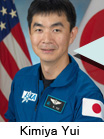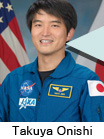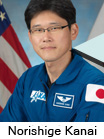JAXA Astronaut Activity Report, July 2011
Last Updated: September 20, 2011
This is JAXA's Japanese astronaut primary activity report for July 2011.
Three new astronauts were born

Holding JAXA Astronaut Certification From left, Astronauts Onishi, Yui, and Kanai (Credit: JAXA)
Astronaut candidates Yui, Onishi, and Kanai have completed all the basic training sessions for astronaut candidates for future expedition missions aboard the International Space Station (ISS), which commenced in 2009, and were certified as JAXA astronauts as of July 25.
At the press conference held for the new astronauts in the JAXA Tokyo office, they discussed their two-year training, current feelings and future aspirations, and also answered questions from reporters.
The new three astronauts will continue to be based in the NASA Johnson Space Center (JSC) and train in various countries, including Japan, to gain and improve the knowledge and skills required to be an astronaut.
Astronaut Hoshide trains for Kibo and KOUNOTORI (HTV)

Lecture on KOUNOTORI (Credit: JAXA)
Astronaut Hoshide temporarily returned to Japan and participated in the training sessions for the Kibo Japanese Experiment Module and the H-II Transfer Vehicle (HTV), KOUNOTORI.
By receiving lectures and simulation training, he confirmed the operations of Kibo's primary systems; including the Command and Data Handling (C&DH), system which monitors and controls the status of entire systems of Kibo and the experimental equipment, the Electrical Power System (EPS), which supplies electric power to each piece of hardware, the Thermal Control System (TCS), which acts as a heat exhauster by circulating coolant, and the Environmental Control and Life Support System (ECLSS), which adjusts the temperature and humidity and circulates air. In addition, he checked the Kibo airlock operations and conducted simulation training on the Remote Manipulator System (JEMRMS).
For Kibo's experiment training, he deepened understanding of the High Quality Protein Crystallization (JAXA PCG) experiment and gained an overview of the Protein Crystallization Research Facility (PCRF), which is used for the experiment. He also trained on the other experiments planned during his long-duration mission and systems that relate to supporting experiments such as the Multi-purpose Small Payload Rack (MSPR) and Image Processing Unit (IPU) .
As for KOUNOTORI, he trained on the overall operations and system's overview, crew's tasks, and operation of the Exposed Pallet (EP).
ISS Utilization Symposium - Contributing to Japan's recovery and revitalization -

Astronaut Wakata speaks at the panel discussion (Credit: JAXA)
Astronaut Wakata participated in the ISS Utilization Symposium - Contributing to Japan's Recovery and Revitalization -, held on July 31, at the Marunouchi Building Hall & Conference Square in Chiyoda Ward, Tokyo.
Through lectures and panel discussion, the symposium involved public attendants and discussed how the safety management, risk management, and various technologies developed for the ISS mission could be utilized for Japan's recovery, revitalization, and the creation of a safe society.
During the panel discussion on how information should be shared in the event of a crisis, Astronaut Wakata discussed "sharing the correct information to identify risk and foster a trusting relationship as key", based on his experience during his ISS expedition mission when he learned the importance of sharing information with the ground controller. In addition, a serious discussion ensued on safety design and leadership with other panelists holding various positions and experience.
JAXA Symposium 2011 "HAYABUSA's Achievement and Long-duration Stay in the ISS"


Astronauts Wakata (above) and Noguchi (below) at each talk session (Credit: JAXA)
Astronauts Wakata and Noguchi participated in the JAXA Symposium 2011, entitled "HAYABUSA's Achievement and Long-duration Stay in Space". Astronaut Noguchi participated in that held on July 7 in Tokyo, while Astronaut Wakata participated in that held on July 30 in Kyoto.
Each astronaut participated in the talk session entitled "Marking 50 years since Gagarin - From 'going to space' to 'living in space'"- with Mr. Kaoru Takeuchi, a scientific writer. During the talk session, video and pictures were also introduced including a brief review of Yuri Gagarin's launch into space, the current status of the ISS program under multinational cooperation, Japan's contribution to the ISS, and future human space exploration foresights.
At the end of the talk session, Astronaut Wakata expressed his goal as commander for his next ISS expedition mission, "senior astronauts have expanded our future opportunities in space step by step. Japan has credible technology such as Kibo and KOUNOTORI. I think the reason why I was appointed as commander is based on the continued success of senior Japanese astronauts and the credibility of Japan's technology. I'll do my best in order to further enhance Japan's credibility."
Astronaut Noguchi mentioned his changed attitude toward life after experiencing space flight, "having seen the whole Earth from space, I was clearly aware that Earth has limited resources. At the same time I started having the strong desire to preserve our Earth", as his anecdote on the fragility of Earth and preciousness of life.








